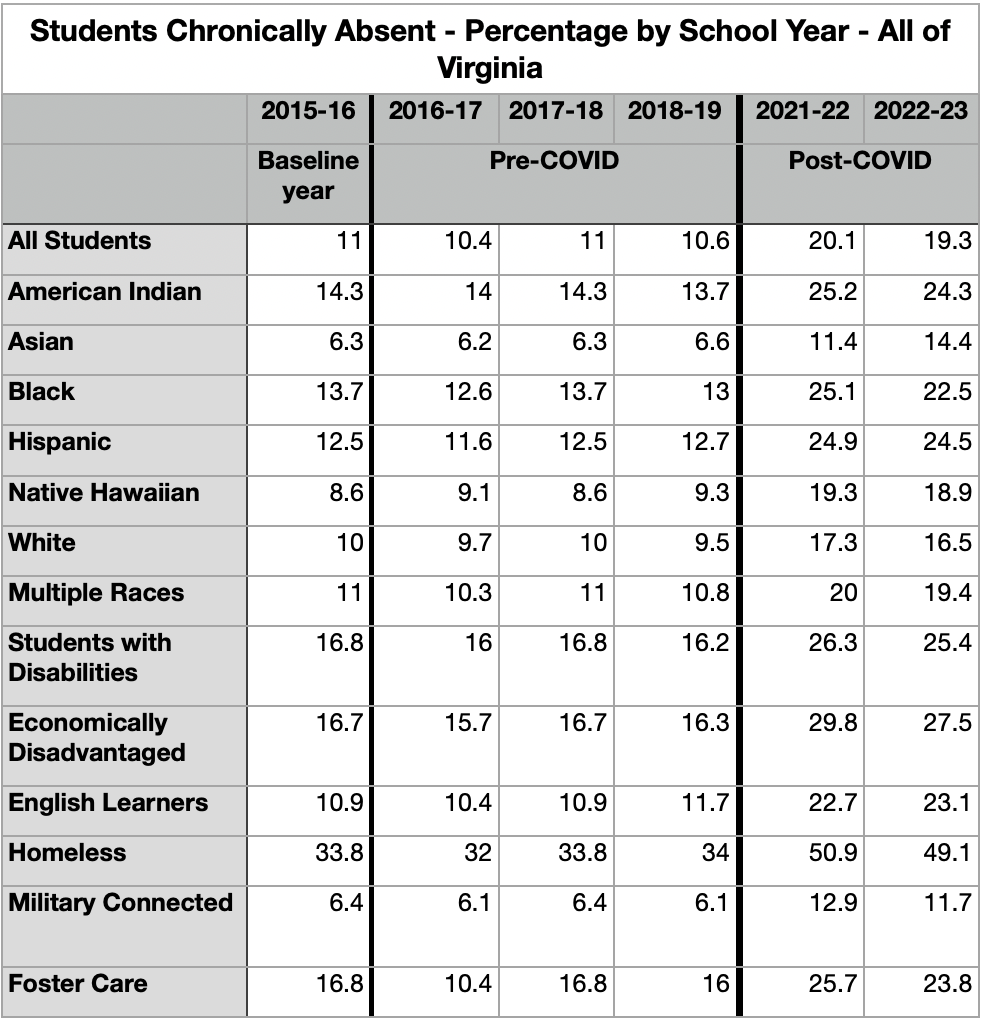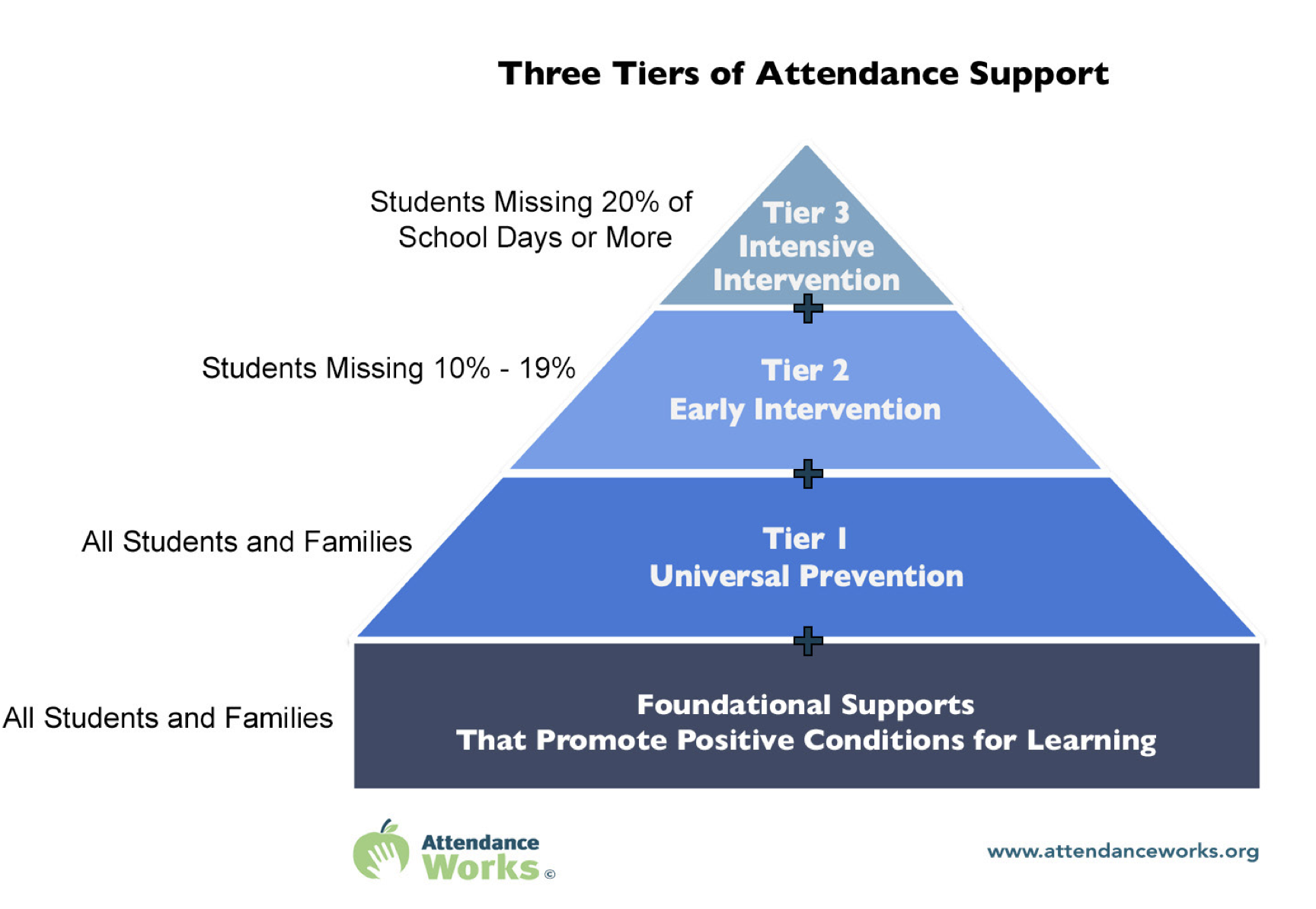
by James C. Sherlock
Governor Youngkin, in response to the real crisis in our schools, has established a Chronic Absenteeism Task Force led by the Virginia Superintendent of Public Instruction.
The Task Force is supported by the non-profit Attendance Works.
Attendance Works so dominates VDOE’s Attendance & School Engagement page that it can be deemed a key component of the home team.
That organization has teamed with FutureEd to write an updated Attendance Playbook (Playbook). The version at the link is a post-Covid update of an earlier edition that has been followed by VDOE in policy development since at least 2015.
The resulting complex and school-resource-heavy multi-tiered approach to improving attendance has proven inadequate to the task.
- Using a baseline year of 2015-16, chronic absenteeism among all students statewide did not decline in a statistically significant way under the new program;
- Group-to-group ratios and gaps in absenteeism statistics remained the same; and
- Absenteeism rates doubled together for all groups after COVID.

Home team policies have failed.
That is possibly because no Playbook policies provide evidence for improving attendance that has met the standards of the federal Department of Education’s (DOE) Institute of Education Sciences (IES) What Works Clearinghouse (WWC).
Which is DOE’s home team.
The rigorous standards of WWC are required by DOE guidance Using Evidence to Strengthen Education Investments (Using Evidence) for a reason.
“The Department emphasizes the use of evidence-based activities, strategies, and interventions (collectively referred to as “project components”) in the design of education programs from pre-kindergarten through adult education.”
“The Department’s WWC uses rigorous standards to review education research, offering evidence of effectiveness on a wide range of project components.”
“Organizations should select project components that are supported by the most rigorous evidence
available, consider the needs of the learner population being served, and consider the ability and
capacity of the organization to implement.”
They work.
A progressive approach. The Virginia Department of Education (VDOE) has been collaborating with Attendance Works for years. That coordination is cited in VDOE’s Attendance and School Engagement.
From Attendance Works mission statement:
…to shift away from punitive action and instead partner with students and families to address the challenges that prevent them from participating in learning. [Emphasis added.]
Read that whole page. Please.
You will not miss what they are about.
The updated Playbook published in May of this year offers post-pandemic dos and don’ts for reducing student absenteeism. Updated strategies look very much like the pre-Covid strategies.
Playbook cites 500+ studies in support of its recommendations for and against various absenteeism interventions. None of them have met WWC evidence standards for improving attendance.
Attendance Playbook’s Three Tiers of Support.  Note above that Tier 2, Early Intervention, now commences when students are already chronically absent. Thus, in an apparent bow to the failure of their pre-COVID prescriptions and post-Covid absenteeism rates, they re-define “early.”
Note above that Tier 2, Early Intervention, now commences when students are already chronically absent. Thus, in an apparent bow to the failure of their pre-COVID prescriptions and post-Covid absenteeism rates, they re-define “early.”
Even Tier 3, Intensive Intervention, in which they somehow define post-Covid for “students missing 20% of school days or more,” avoids reference to holding parents accountable for their kids’ truancy.
Piling on. There is more than one reason other than the use of interventions unproven to improve attendance that Virginia attendance policies have not moved the needle on absenteeism in general or changed the rates of individual groups.
From Using Evidence:
“Organizational capacity to effectively implement a project component is also important to consider”. (underlined in the reference)
Playbook
attendance interventions, fully implemented, are very demanding of the time of school professionals already stressed by the accumulations of such policies.
Virginia schools have a lot to do before they ever teach a single student in a classroom.
Consider Student Services. Among them are
- Virginia Tiered Systems of Supports (VTSS)
- Virginia Community School Framework
- Student Assistance Programming
- Social Emotional Learning (SEL)
- Student Support and Conduct
Then there are all the Model Guidance and Model Policies.
Guidance like Positive and Preventive Code of Student Conduct Policy and Alternatives to Suspension.
Model policies like Ensuring Privacy, Dignity, and Respect for All Students and Parents in Virginia’s Public Schools.
Poor Playbook standards. The editors of Playbook relied on a single researcher to find evidence of scientific validity and intervention effectiveness.
An important aspect of our analysis was gauging the quality of the research supporting absenteeism interventions.
That researcher unearthed a 28-page bibliography that supports those over 500 citations accepted by the editors.
Perhaps unsurprisingly, they support the preferred policies of the author and editors.
WWC was established in 2002 because educational research had earned a terrible reputation. It is overseen by the National Academy of Sciences and chartered to assess and report the quality of educational research. It identifies “well-designed studies, trustworthy research, and meaningful findings to inform decisions and improve student outcomes.”
WWC has assessed 3,053 studies in the field of education since 2003. The rest of the available studies did not make the initial cut for referral to human assessment; 1,427 of 3,053 met design standards.
Assessing those for positive results,
- 167 yielded strong evidence that the studied interventions worked;
- 118 yielded moderate evidence;
- 340 yielded promising evidence.
So, 625.
The 1,437 studies that WWC judged well-designed included only five studies of attendance (all topics). None of those five were assessed to provide statistically significant positive results about attendance interventions at any of those three levels of evidence.
WWC creates practice guides from those studies that meet standards and offer significant evidence of positive interventions. They are excellent resources.
There is, of course, no WWC practice guide for improving attendance. Better evidence will need to be developed.
The only study on truancy that met minimal WWC standards is here. It met WWC standards “with reservations” but “showed no statistically significant positive findings.”
Contrast that with a search for “behavior” as a different example. Seventeen studies both met standards and had strong positive effects.
Observations.
- Virginia’s list of attendance interventions that took twelve instruction modules (recently deleted) to explain was unlikely to reliably function in school divisions already overburdened with those other bright, eminently progressive ideas of the schools of education.
- Virginia’s Attendance Works approach has failed to move the needle on attendance either before or after COVID;
- Policy recommendations offered by Attendance Works and accepted by VDOE have lacked any recommendations for what to do if the recommended interventions, none of which include enforcement, fail to work; and
- Attendance Works standards for both valid studies and proven evidence of the efficacy of attendance interventions have failed the test, not only of WWC reviews, but of multiple years of field results in Virginia.
Recommendations. First.
I recommend that Attendance Works be dismissed from assisting the Task Force.
Second, I recommend that the Task Force consider any interventions to reduce excessive absenteeism in the context of the breathtaking range of other things that schools are expected to accomplish in addition to academic instruction.
Third, What Works Clearinghouse standards are used by the federal Department of Education to judge applications for grants. I recommend that the Virginia DOE make that its own standards for judging policies.
This will be a series.
Update. This article has been edited on Dec. 18, 2023 to align it with the book version. The original text that recommended changes to child neglect legislation has been moved to a Part Three.
See footnote for today’s changes to VDOE website on attendance.

Leave a Reply
You must be logged in to post a comment.